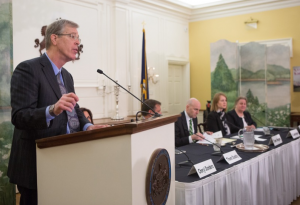
The Surgeon General of the United States, Dr. Vivek Murthy, recently released an in-depth report on addiction – the first of its kind from the nation’s top doctor.
Pennsylvania Department of Drug and Alcohol Programs Secretary Gary Tennis remarked in a press release last week that he hopes the report will “raise awareness and help galvanize action toward getting treatment for people with substance use disorder (SUD)”.
The report, which has become a symbol of the true seriousness of drug and alcohol addiction, has classified SUD as a chronic condition, much like heart disease or diabetes, which cannot be treated correctly without proper health care.
“We are in the middle of the worst opioid epidemic in history, and this report confirms it,” said Tennis. “Many Pennsylvanians know someone suffering from the disease of addiction or they may be suffering themselves. The results of this disease are devastating – it has a terrible impact on crime, health of the individual and the family, quality of life, vehicle crashes, workplace injuries. Most importantly, left untreated it is ultimately fatal.” According to Tennis, more than 3,500 people died in the Commonwealth from overdoses in 2015, surpassing the number of people who died from automobile accidents; the fatality rate for 2016 is expected to be even higher.
Murthy’s report analyzes that more than 27 million people in the United States reported current use of illicit drugs or misuse of prescription drugs, while more than 66 million reported binge drinking. The report also estimated the annual economic impact of drug abuse to be $193 billion, while the estimated economic impact of alcohol abuse if $249 billion. The report asserts that every dollar invested in drug and alcohol treatment saves $4 in healthcare and lost productivity costs and another $7 in criminal justice costs.
“It is both inhumane and fiscally irrational to not fully address the treatment needs of our population and yet, according to the Surgeon General, we have enough treatment nationally to meet only 10 percent of what’s needed,” said Tennis.
The report notes that prevention, treatment, and recovery policies and programs, all work together to encourage communities to organize coalitions to determine local levels of risk and protective factors and substance misuse problems. Tennis asserts that the Commonwealth is already following the report’s recommendations of Naloxone usage, drug take-back boxes, a warm-handoff strategy where overdose survivors are encouraged to seek treatment before being released from the hospital, the expansion of Medicaid, guidelines for prescriptions, and new opioid legislation.
Gov. Tom Wolf and state lawmakers have been instrumental in many of these methods, by reversing 10 years of funding cuts to drug and alcohol treatment by expanding Medicaid, and signing into law bills which limit the amount of opioids that can be prescribed and requiring all prescribers and dispensers of opioids to include the information in a statewide database.
“I applaud Surgeon General Murthy for calling for a ‘culture change’ in the way we address addictions. It’s time to get rid of negative stereotypes. Addiction is a brain disease, not a moral failing,” said Tennis. “Stigmatizing the disease, so that our loved ones feel too ashamed to get help, only increases the number of Pennsylvanians who will die unnecessarily. By uniting in the fight against stigmatizing attitudes and policies, we are taking a stand for safer, healthier, happier families and communities.”









